
The governor of Oregon is the head of government of Oregon and serves as the commander-in-chief of the state's military forces. The title of governor was also applied to the office of Oregon's chief executive during the provisional and U.S. territorial governments.
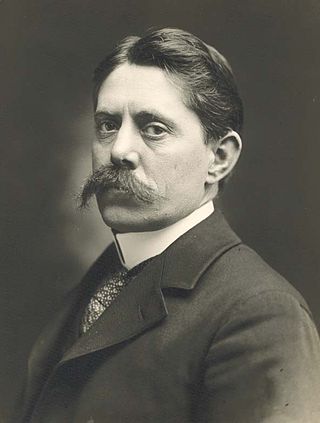
John Isaac Cox was an American politician who served as the 29th governor of Tennessee from 1905 to 1907. He was elevated to the position when Governor James B. Frazier resigned, and, as Speaker of the Tennessee Senate, he was the first in the line of succession. He failed to win his party's nomination for a second term, and returned to the state senate, where he remained until 1913. Cox also served as a county judge, city attorney, and local postmaster, and spent two terms in the Tennessee House of Representatives.

The 1966 United States Senate elections were elections on November 8, 1966, for the United States Senate which occurred midway through the second term of President Lyndon B. Johnson. The 33 seats of Class 2 were contested in regular elections. Special elections were also held to fill vacancies. With divisions in the Democratic base over the Vietnam War, and with the traditional mid-term advantage of the party not holding the presidency, the Republicans took three Democratic seats, thereby breaking Democrats' 2/3rds supermajority. Despite Republican gains, the balance remained overwhelmingly in favor of the Democrats, who retained a 64–36 majority. Democrats were further reduced to 63–37, following the death of Robert F. Kennedy in June 1968.

Robert Denison Holmes was an American politician and journalist from the U.S. state of Oregon. A native of the state of New York, he worked in newspapers and radio before entering politics. Though a Republican early in his career, he served as a Democrat in the Oregon State Senate and as the 28th Governor of Oregon. He was governor from 1957 to 1959.
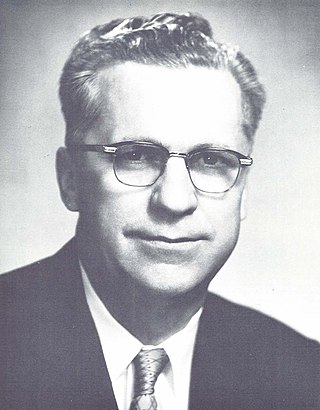
Elmo Everett Smith was an American Republican politician who served as the 27th Governor of Oregon from 1956 to 1957.
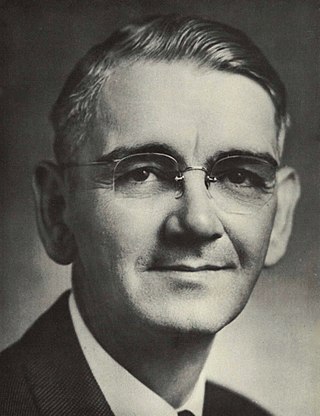
Paul Linton Patterson was an American Republican politician. A native of Ohio, he served in World War I before becoming an attorney in Oregon. Later he served as President of the Oregon State Senate (1951–1952) and the 26th Governor of Oregon (1952–1956). He was the first Governor of Oregon who was born in the 20th century, as well as the most recent one to die in office.
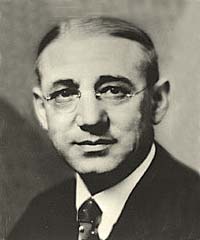
Albin Walter Norblad Sr. was a prominent lawyer who lived in Astoria, Oregon, United States, and the 19th Governor of Oregon from 1929 to 1931. He was a Republican.

United States gubernatorial elections were held on November 2, 2010, in 37 states and two territories. These elections coincided with the elections for the United States Senate and the United States House of Representatives as well as other state and local elections. As in most midterm elections, the party controlling the White House lost ground. Democrats took five governorships from the Republicans, while Republicans took 11 governorships from the Democrats. An independent won one governorship previously held by a Republican, while a Republican won one governorship previously held by an independent. Republicans held a majority of governorships for the first time since before the 2006 elections. One state, Louisiana, had no election for governor, but it did feature a special election for lieutenant governor.

Tobias Read is an American politician who is the secretary of state-elect of Oregon. As a member of the Democratic Party he has been serving as the Oregon State Treasurer since 2017. He was a member of the Oregon House of Representatives, representing the 27th district from 2007 to 2017, which comprises parts of Beaverton, southwest Portland, and unincorporated Multnomah and Washington Counties. He served as Speaker Pro Tempore and was formerly the Democratic Majority Whip.

A lieutenant governor is an official in state governments of 45 out of 50 of the United States. In most cases, the lieutenant governor is the highest officer of state after the governor, standing in for that officer when they are absent from the state or temporarily incapacitated. In the event a governor dies, resigns or is removed from office, the lieutenant governor typically becomes governor.

The 1930 Oregon gubernatorial election took place on November 4, 1930 to elect the governor of the U.S. state of Oregon. The Oregon Republican Party, at the time dominant in Oregon politics, initially nominated George W. Joseph, but the nominee died prior to the general election. Joseph's former law partner Julius Meier entered the race as an independent, and defeated replacement Republican nominee Phil Metschan, Jr., Democrat Edward F. Bailey, and Socialist Albert Streiff to become the first and only Independent politician to be elected Governor of Oregon.

The 2014 Oregon gubernatorial election was held on November 4, 2014, to elect the Governor of Oregon, concurrently with other elections in Oregon and across the United States.
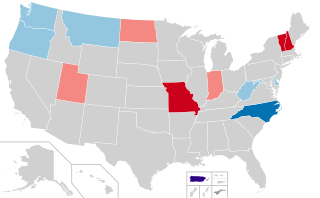
United States gubernatorial elections were held on November 8, 2016, in 12 states and two territories. The last regular gubernatorial elections for nine of the 12 states took place in 2012. The last gubernatorial elections for New Hampshire, Oregon, and Vermont took place in 2014, as Oregon held a special election due to the resignation of Governor John Kitzhaber, while the governors of New Hampshire and Vermont both serve two-year terms. The 2016 gubernatorial elections took place concurrently with several other federal, state, and local elections, including the presidential election, Senate, and House elections.
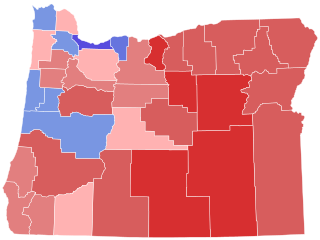
The 2016 Oregon gubernatorial special election took place on November 8, 2016, to elect the Governor of Oregon, concurrently with the 2016 U.S. presidential election, as well as elections for the U.S. Senate and U.S. House of Representatives, other gubernatorial elections and various state and local elections.
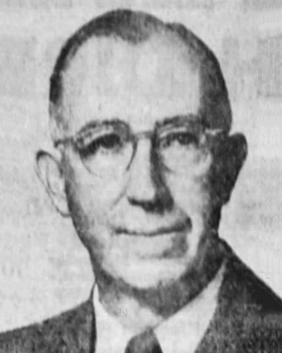
Edward Andrew Geary was an American politician and farmer from the state of Oregon. He was a Republican who served eight years in the Oregon House of Representatives. In the house, Geary represented a large rural district in southern Oregon. He served as Speaker of the Oregon House of Representatives during the 1955 legislative session. He also served as acting governor of Oregon for several brief periods in the mid-1950s.

United States gubernatorial elections were held on November 8, 2022, in 36 states and three territories. As most governors serve four-year terms, the last regular gubernatorial elections for all but two of the seats took place in the 2018 U.S. gubernatorial elections. The gubernatorial elections took place concurrently with several other federal, state, and local elections, as part of the 2022 midterm elections.

Lew Wallace was an American Democratic politician from the state of Oregon. He served in both houses of the Oregon Legislative Assembly and was a five-time gubernatorial candidate.

The 2022 Oregon gubernatorial election took place on November 8, 2022, to elect the governor of Oregon. Incumbent Kate Brown took office when fellow Democrat John Kitzhaber resigned on February 18, 2015. She won the subsequent 2016 special election a full term in 2018. Due to term limits, she was unable to run again in 2022.

The 1960 United States Senate elections in Oregon took place on November 8, 1960.






















